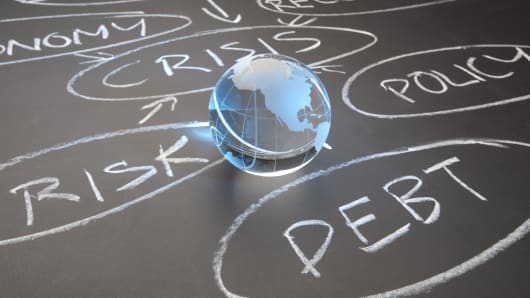U.S. stocks suffered their worst January in at least seven years last month, as the slump in oil prices, coupled with China’s economic slowdown and continued market interventions, roiled global assets.
But Myles Bradshaw, the head of global aggregate fixed income at Amundi, believes markets have been too hasty to call an economic slump and now is the time to buy underpriced riskier assets.
“I think you have got to take a step back — because you can get caught up with the noise of the markets — and ask yourself, fundamentally, what is the outlook for the global economy?” he told CNBC in London.
“Many markets are now pricing in a significant probability of recession and when we talk about recession, we’re talking particularly about a U.S. recession. Do you think that is likely or not? To me, the odds are too high; the market is pricing too high a probability.”
The U.S.’s Nasdaq composite declined by around 7.9 percent in January, although sharp gains on Friday pushed the tech-focused index into positive territory for the week, along with the Dow Jones industrial average and the S&P 500 index.
Bradshaw said that markets were putting a too-low probability on U.S. growth reaching 2-2.5 percent in 2016.
“If you look at the data, clearly there are clouds on the horizon. It’s not certain, but to me, we don’t deserve to be pricing in that much recession risk. So I would argue that now is the time to actually focus on valuations, understand the technical factors that are cheapening these markets, which are in part to do with people liquidating their assets, and actually be a bit of a contrarian investor,” he told CNBC.
On Monday, Oxford Economic said that some indicators, such as declining industrial activity in the G-7 economies, suggested a “moderate” risk of a global recession. However, the research firm highlighted that indicators such as this, and others such as equity market slumps, could overstate the risk of recession.
After all, Nobel Prize-winning economist, Paul Samuelson, famously said that stock markets had predicted nine out of the last five recessions.
Data released on Friday suggested U.S. economic growth slowed to an annualized 0.7 percent in the fourth quarter of last year. This was in line with expectations but down sharply from the annualized 2.0 percent growth seen in the third quarter.
Across 2015, the economy grew by 2.4 percent, after a similar expansion in 2014.
Bradshaw said markets needed more data to be confident of the Federal Reserve’s more optimistic outlook for the U.S. economy and expected path of interest rate hikes.
“You would not necessarily expect risk assets to rally sharply back to where they were at the start of the year, but now to me seems the time to be picking up reasonable and cheap assets in the market,” he told CNBC.
Amundi is a European asset management company that was jointly created by Credit Agricole and Societe Generale. It has 950 billion euros ($1.0 trillion) in assets under management.
[“source -cncb”]





